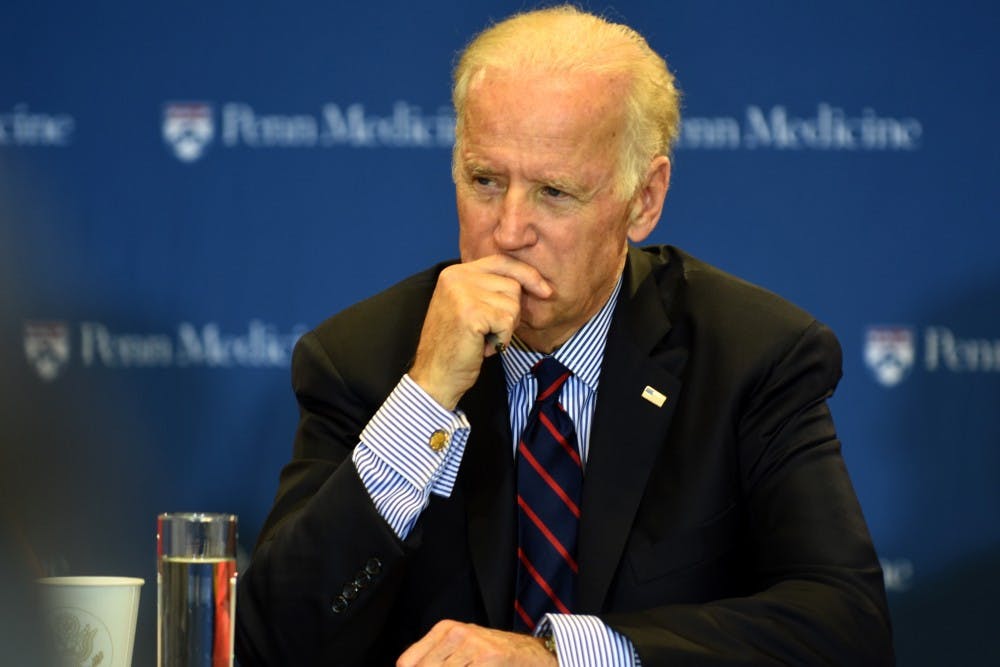
On his mission to abolish cancer, Joe Biden stopped at Penn's Abrasion Cancer Center today and had the following to say about America: "[I can] define America in one word: possibilities."
Credit: Susanna JaramilloLess than a week after President Barack Obama tasked him with leading an effort to cure cancer in his State of the Union address, Vice President Joe Biden launched the new initiative Friday afternoon with a roundtable discussion at Penn’s Abramson Cancer Center.
After making brief opening remarks, Biden discussed the future of cancer research with a panel that included Penn President Amy Gutmann and National Institutes of Health Director Francis Collins.
“I’d like you to educate me,” Biden said to the assembled roundtable.
The launch of Biden’s mission to cure cancer comes months after his eldest son and 1991 College graduate Beau Biden from brain cancer and three months after he decided not to run for president in 2016. While announcing his decision, Biden called for a “moon shot in this country to cure cancer” and promised to devote his remaining time as vice president to achieving this goal. Biden invoked his personal experience with cancer in the discussion.
“My family is a normal family in that ours has been touched by cancer,” Biden said in his opening remarks.
The family’s extensive connections to Penn were one of the reasons Biden chose it as the launchpad of his new mission. His daughter Ashley graduated from the School of Social Policy and Practice in 2010 and his granddaughter Naomi is a current College senior.
One of Biden’s main priorities will be bringing together skills, funding, facilities, data and other assets from a variety of public and private sector sources so that all interested parties will have the necessary tools to make productive contributions towards his mission. Biden said that such “crosspollinization” of medical expertise is crucial to finally unlock the secrets of eradicating cancer, and cited Penn as a prime example of this collaboration.
He spoke of an upcoming executive order from Obama that would require a myriad of federal agencies to make their research resources available to Biden’s mission. “This is one of the most difficult and complex enterprises I’ve taken on in my career,” Biden said.
The Penn administration has already pledged to contribute its own resources to Biden’s national campaign. Gutmann, who participated in the roundtable with Biden, praised his eagerness to explore and incorporate a diverse range of academic disciplines into his new project.
“You have a unique position from being able to speak from not one chair, but how everybody thinks,” Gutmann said.
Biden cited Penn as an example of an institution that already possesses the required willingness and expertise to achieve a cure for cancer. The Penn Presbyterian Medical Center, part of the University of Pennsylvania Health System, was ranked the eleventh-best hospital in the country for adult cancer treatment, according to U.S. News and World Report.
Perelman School of Medicine Dean Larry Jameson wrote in an email that Penn has a history of bringing together scientists with complementary skills, as well as researchers and other partners in the private sector. Such partnerships had led to Penn teams making some of the most groundbreaking discoveries in the history of cancer research, such as the link between cancer and genetics.
Biden also spoke about the growing importance of information technology, citing massive documentary archives that contain previously overlooked medical evidence. Many panelists repeatedly voiced support for sharing and jointly analyzing these documents for medical clues.
“I think ‘moon shot’ is real. It is not a fantasy because all the pieces of the puzzle are there,” Gutmann said.
Local lawmakers are optimistic that Biden can successfully integrate both public and private sector interests into his plans, both on a national scale and locally.
“Pennsylvania is one of the nation’s top recipients in NIH dollars and there’s a reason for that: our state has some of the best medical facilities, research institutions and medical professionals in the country,” U.S. Sen. Bob Casey (D-Pa.) said in an emailed statement.
Congressman and Penn alumnus Chaka Fattah (D-Pa. 2), who represents the University City area, was particularly pleased that Penn, historically one of Philadelphia’s most influential research institutions, was chosen to launch Biden’s campaign.
“The fact that just a few blocks away, now, medical scientists are going to help lead the way to eliminate cancer from the face of the Earth — I think there’s an appropriate synergy to this,” Fattah said.
Fattah, the highest-ranking Democratic member of the Congressional committee responsible for scientific appropriations, is an active proponent of increased federal funding for medical research. He was an early co-sponsor of the Recalcitrant Cancer Research Act of 2012 and voted in favor of the 21st Century Cures Act, a bill that reclassifies significant scientific research as mandatory spending.
“I have every confidence that we’re going to succeed,” Fattah said. “He is the right person to lead this effort.”
Biden himself did not promise to stick to a particular timeline, although he expressed his belief that a cure for cancer is not that far off. He will devote whatever is necessary to make his dream of eradicating cancer a reality.
“I plan on doing this for the rest of my life,” he said before the audience erupted in applause.
The Daily Pennsylvanian is an independent, student-run newspaper. Please consider making a donation to support the coverage that shapes the University. Your generosity ensures a future of strong journalism at Penn.
DonatePlease note All comments are eligible for publication in The Daily Pennsylvanian.







